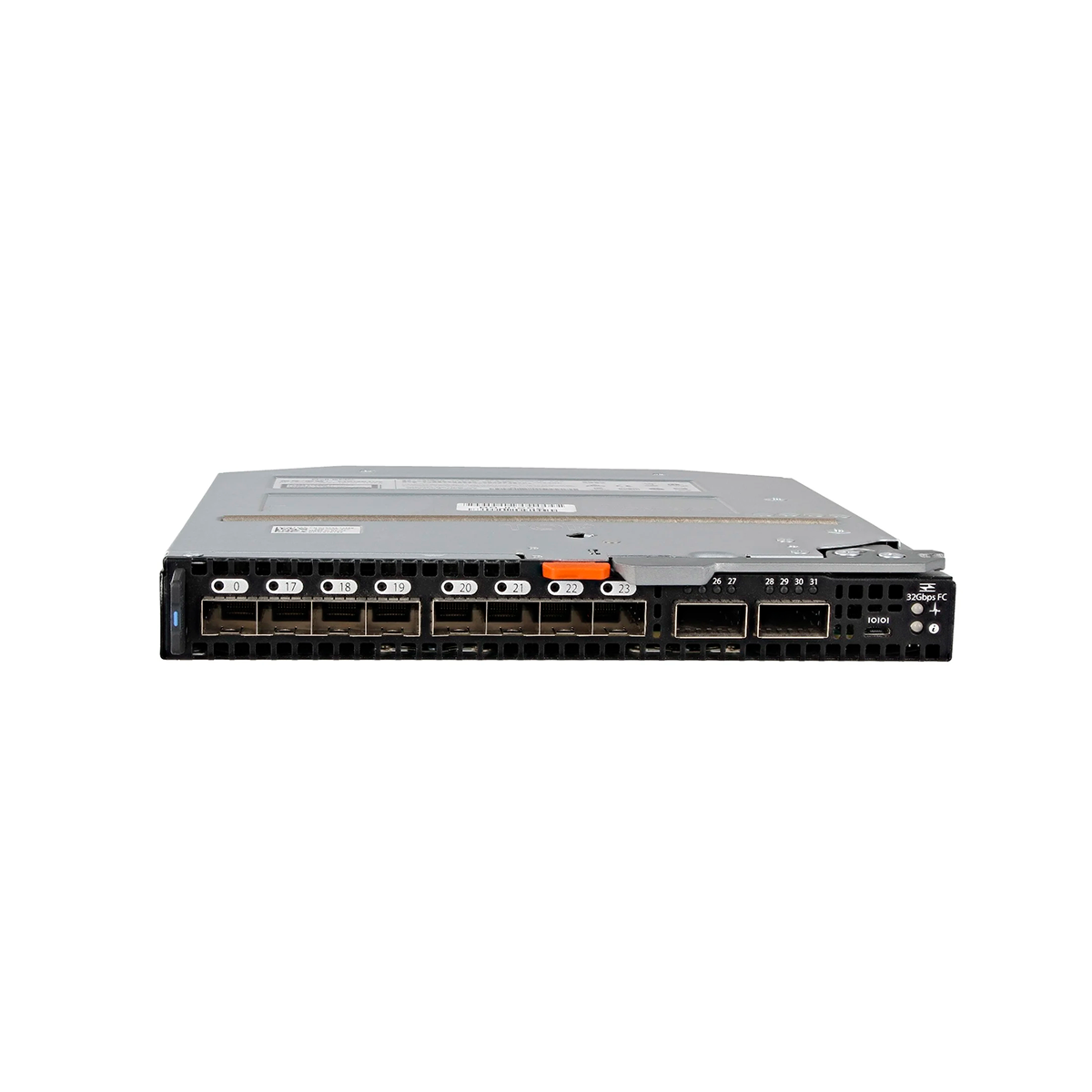Dell EMC MXG610S Fibre Channel Switching Module
0.00$
Specifications
Total Fibre Channel Ports:
Up to 16 internal server facing and up to 16 external fabric facing ports (8-port increments through dynamic Ports on Demand (POD) license.
The 16 internal server facing ports operate at either 16 Gbps or 32 Gbps speed depending on the minimezzanine adapter, and do not require any optical transceivers.
The 16 external fabric facing ports are available in two different port types:
8 external SFP ports operate at 8Gbps, 16Gbps, or 32Gbps speed
2 external QSFP ports offer 4 ports each operate at 16Gbps or 32Gbps speed
Supported Optics:
Transceiver, 16Gbps FC, SWL SFP
Transceiver, 16Gbps FC, LWL SFP
Transceiver, 32Gbps FC, SWL SFP
Transceiver, 32Gbps FC, LWL SFP
Transceiver, 16Gbps FC, SW4 QSFP (supports 1×4 Breakout)
Transceiver, 32Gbps FC, SW4 QSFP (supports 1×4 Breakout)
ANSI Fibre Channel protocol:
Fibre Channel Physical and Signaling Interface standard (FC-PH)
Modes of operation:
Fibre Channel Class 2 and Class 3
Fabric initialization:
Complies with FC-SW-3 Rev. 6.6
Scalability:
Full-fabric architecture with a maximum of 239 switches
Certified maximum:
6,000 active nodes, 56 switches, 19 hops in a Fabric OS fabrics
ISL trunking:
Frame-based trunking with up to eight ports per ISL trunk for an up to 256 Gbps per ISL; supporting trunk Exchange-based load balancing across ISLs with DPS included in Fabric OS
Max. Switching bandwidth:
1024 Gbps (32 * 32 Gbps) in Full Fabric Switch mode
Max. Throughput:
512 Gbps (16 * 32 Gbps) in Access Gateway mode (default mode)
Maximum port-to-port latency:
Latency for locally switched ports is ≤ 900 ns (including FEC)
Maximum frame size:
2,112-byte payload
Frame buffers:
2,000 dynamically allocated
Classes of services:
Class 2, Class 3, Class F (inter-switch frames)
Port types:
F_Port, E_Port, M_Port, D_Port (ClearLink Diagnostic Port), N_Port
Data traffic types:
Fabric switch supporting unicast
Fabric Services:
Monitoring and Alerting Policy Suite (MAPS); Flow Vision; Brocade Adaptive Networking (Traffic Isolation, QoS); Fabric Performance Impact (FPI) Monitoring; Slow Drain Device Quarantine
(SDDQ); Brocade Advanced Zoning (default zoning, port/WWN zoning, broadcast zoning, peer zoning, target-driven zoning); Dynamic Fabric Provisioning (DFP); Dynamic Path Selection
(DPS); Brocade Extended Fabrics; Enhanced BB credit recovery; FDMI; Frame Redirection; Frame-based Trunking; FSPF; Brocade ISL Trunking; Management Server; NPIV; NTPv3;
Registered State Change Notification (RSCN); Reliable Commit Service (RCS); Simple Name Server (SNS); Read Diagnostics Parameter (RDP), VM Insight
Note: Some fabric services do not apply or are unavailable in Access Gateway mode.
Supported management software:
HTTP, SNMP v1/v3 (FE MIB, FC Management MIB), SSH; Auditing, Syslog; Brocade Advanced Web Tools; Command Line Interface (CLI); SMI-S compliant; Administrative Domains; trial
licenses for add-on capabilities
Security:
DH-CHAP (between switches and end devices), FCAP switch authentication; HTTPS, IPsec, IP filtering, LDAP with IPv6, OpenLDAP, Port Binding, RADIUS, TACACS , User-defined Role-
Based Access Control (RBAC), Secure Copy (SCP), Secure RPC, Secure Syslog, SFTP, SSH v2, SSL, Switch Binding, Trusted Switch
Management access:
1 micro USB type B port for console/management
Diagnostic:
ClearLink optics and cable diagnostics, including electrical/optical loopback, link traffic/latency/distance; flow mirroring; built-in flow generator; POST and embedded online/offline
diagnostics, including environmental monitoring, FCping and Pathinfo (FC traceroute), frame viewer, non-disruptive daemon restart, optics health monitoring, power monitoring, RAStrace
logging, and Rolling Reboot Detection (RRD)
Physical
Full featured Gbps Fibre Channel IO Module in MXSeries I/O Sled form factor
1 micro USB type B port for console/management port access
Size: 1.08 “h x8.44” w x 9.49 “ d
Weight: 3.79lbs (1.72kg)
Max. power consumption: 60 Watts
Typ. power consumption: 57 Watts
Max. operating specifications:
Standard Operating Temperature -5°C to 50°C (23°F to 122°F)
Operating Relative Humidity 5% to 95%
Max. non-operating specifications:
Storage temperature: -40°C to 70°C (-40°F to 158°F)
Storage humidity: 5% to 95% (RH) with 33°C (91°F) maximum dew point
Expanded Operating Temperature, Continuous Operation: 5°C to 50°C at 5% to 85% RH with 29°C dew point
Redundancy
Redundant Power and Cooling provided by Dell EMC PowerEdge MX7000 Chassis
Regulatory compliance
Safety
UL/CSA 60950-1, Second Edition
EN 60950-1, Second Edition
IEC 60950-1, Second Edition Including all National Deviations and Group Differences
EN 60825-1 Safety of Laser Products Part 1: Equipment Classification Requirements and User’s Guide
EN 60825-2 Safety of Laser Products Part 2: Safety of Optical Fiber Communication Systems
FDA Regulation 21 CFR 1040.10 and 1040.11
Emissions & Immunity
Australia/New Zealand: AS/NZS CISPR 32:2015, Class A
Canada: ICES-3/NMB-3, Class A
Europe: EN 55024:2010 (CISPR 24:2010), Class A
Japan: VCCI V-3/2010.04 Class A
USA: FCC CFR 47 Part 15, Subpart B:2011, Class A Immunity
EN 300 386 V1.6.1 EMC for Network Equipment
EN 55024:2010
EN 61000-3-2: Harmonic Current Emissions
EN 61000-3-3: Voltage Fluctuations and Flicker
EN 61000-4-2: ESD
EN 61000-4-3: Radiated Immunity
EN 61000-4-4: EFT
EN 61000-4-5: Surge
EN 61000-4-6: Low Frequency Conducted Immunity
RoHS
EN 50581:2012 All MX5108n components are EU
RoHS compliant

